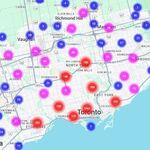Tg11
New Member
I mean my honest opinion yes you can easily compare our city of Toronto to a few American metropolis cities such as:
What Toronto has in common with New York:
Then you can also compare Toronto to Chicago in terms of overall architecture, transit systems but also the amount of immigrants too in Both cities which also goes back to multiculturalism
What Toronto has in common with New York:
- Both the largest cities in their respective countries.
- Both the financial and tourist capitals of Canada and the US respectively
- Both have a high cost of living
- Both have a network of subways, trains and buses serving their greater areas
- Both are known for their skyscrapers (albeit, Toronto's are limited to its Financial District; New York's cover all of Manhattan)
- Both are extremely multi-ethnic, although Toronto is more so (49% of TOs citizens were born somewhere else, compared to 36% of NYC's)
- Both are theatre capitals of the English-speaking world
Then you can also compare Toronto to Chicago in terms of overall architecture, transit systems but also the amount of immigrants too in Both cities which also goes back to multiculturalism






